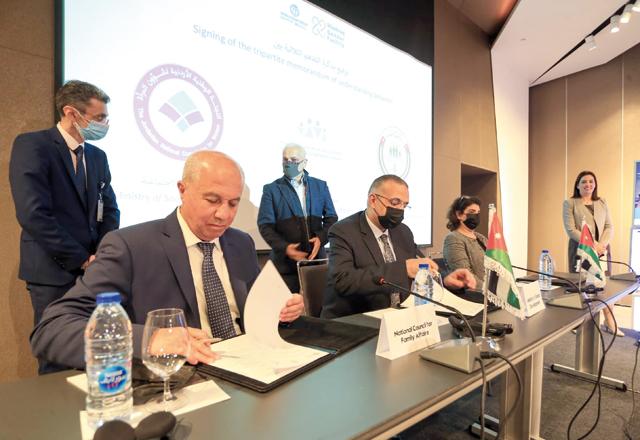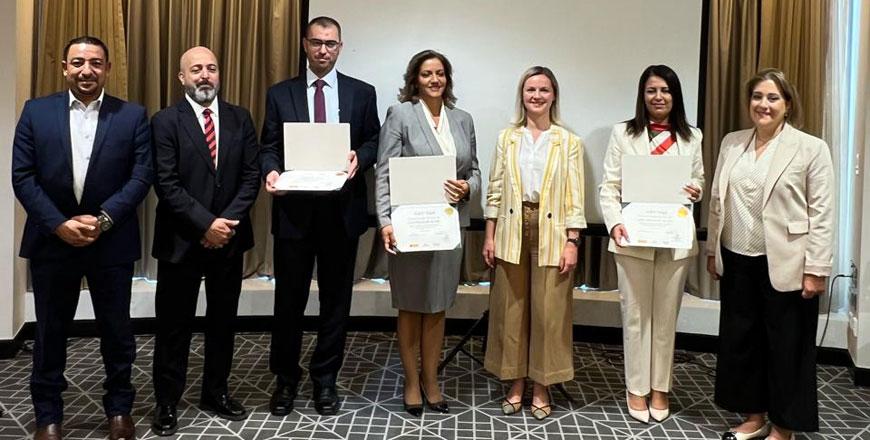You are here
Study highlights correlation between childcare services and women’s workforce participation
By Maria Weldali - Feb 28,2022 - Last updated at Feb 28,2022

Officials from the Ministry of Social Development, the Jordanian National Commission for Women and the National Council for Family Affairs sign a tripartite memorandum of understanding on Monday (Photo courtesy of WBG)
AMMAN — The findings of a study titled “Childcare Services in Jordan: Assessment of Supply and Demand” revealed that low-income households in Jordan have less access to childcare services.
Conducted by the Mashreq Gender Facility (MGF), a World Bank Group (WBG) initiative that works with the Governments of Iraq, Jordan and Lebanon to increase female labour force participation rates, the initial findings of the study were highlighted during a hybrid session on Monday aimed to support women’s employment and the early childhood development in Jordan.
The session saw the signing of a tripartite memorandum of understanding (MoU) among the Ministry of Social Development, the Jordanian National Commission for Women (JNCW) and the National Council for Family Affairs (NCFA).
The MoU seeks to develop and support the childcare sector in the Kingdom, thereby realising the objectives of the National Agenda of Women Economic Empowerment in Jordan (2019-2024), the 2020-2025 National Strategy for Women, and the National Human Resources Development Strategy (2018-2025).
The study showed that the high prices of childcare facilities do not necessarily show that the facility provides a higher quality of education and human resource, however, it is connected with the infrastructure of private childcare facilities.
The study added that there is a huge gap between the numbers of children under the age of five and nursery capacities, with some areas in the Kingdom being entirely devoid of licensed nurseries. Currently private nurseries are the most used by the families surveyed, according to the study.
“Coupled with social norms, low income families often have limited access to childcare support and services, which negatively impact women’s ability to join and stay in the workforce, and contribute to household income,” said WBG Resident Representative to Jordan Holly Benner during the session.
The ongoing pandemic has further limited access to family provided child support, according to Banner, who added that the Jordanian government has taken important policy decisions on childcare provision, including recent policies on supporting private sector childcare, employer provided childcare and child subsidies for working mothers, in addition to licensing home-based nurseries.
“Jordan’s economy cannot grow if nearly half of the workforce is not participating,” she said, noting that bold and effective childcare solutions can help create better opportunities for women to engage in the workforce.
Preschool enrollment rates in Jordan estimated by UNESCO are currently 20 per cent, which means that 80 per cent of children do not start formal education until age of six, she added.
The study used mixed methods to assess childcare service supply and the demand of such services by families and employers in the Kingdom, focusing on the availability, accessibility and affordability of the services, in addition to exploring families’ expectations and employers’ willingness to apply family-friendly policies.
The event was attended by online and in-person audiences including Social Development Minister Ayman Mufleh, JNCW Secretary General Salma Nims, the Education Ministry, Labour Ministry, (NCFA), Planning and International Cooperation Ministry, Social Security Corporation and WBG Jordan representatives.
In Jordan there are 1,179 licensed nurseries, 2,785 childcare providers, 12,191 children enrolled in nurseries, and the number of children without access to childcare services has reached 1,447,153, according to official figures the study shared on Monday.
Related Articles
AMMAN — The Social Development Ministry seeks to increase the number of licensed nurseries in the Kingdom with the aim of realising several
AMMAN — The International Rescue Committee (IRC) and the National Council for Family Affairs (NCFA) held on Thursday a ceremony to launch th
AMMAN — Insufficient government funding is taking a toll on nurseries offering childcare to mothers in the public sector, according to the N

















